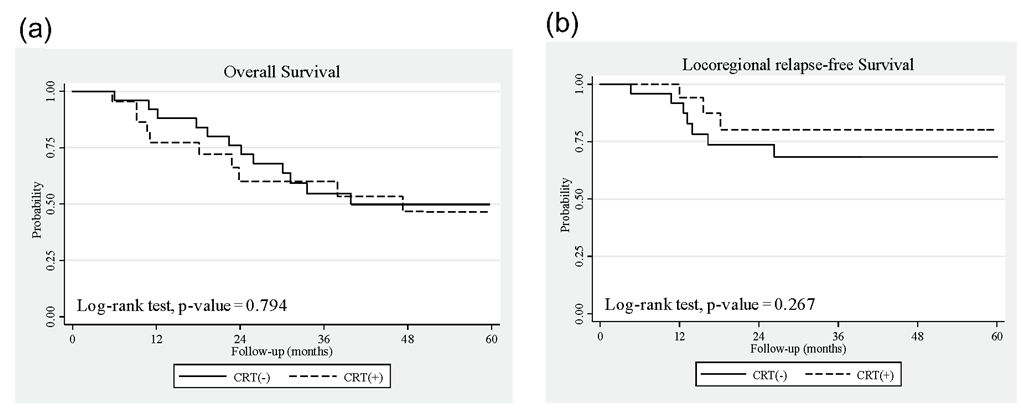글로벌 연구동향
방사선종양학
- [World J Surg.] Role of Adjuvant Chemoradiotherapy for Duodenal Cancer: An Updated Analysis of Long-Term Follow-Up from Single Institution.
이화의대, 서울의대 / 장범섭, 박혜진, 김규보*, 지의규*
- 출처
- World J Surg.
- 등재일
- 2018 Oct
- 저널이슈번호
- 42(10):3294-3301. doi: 10.1007/s00268-018-4692-9.
- 내용

Abstract
BACKGROUND:
There are only limited data on the failure patterns after surgical resection for duodenal cancer, and the role of adjuvant chemoradiotherapy (CRT) also remains controversial. In this study, the treatment outcomes of surgery alone were compared to those of surgery plus adjuvant CRT for duodenal cancer.METHODS:
Between January 1991 and February 2013, a total of 47 patients with duodenal cancer had pancreaticoduodenectomy, and their age ranged from 31 to 80 (median 62). Twenty-five patients (53%) underwent surgery alone, while 22 (47%) underwent surgery plus adjuvant CRT. Postoperative radiotherapy with concomitant 5-fluorouracil was given to tumor bed and regional lymph nodes up to 40-55.4 Gy. Median duration of follow-up was 31 months (range 6-286) for all patients and 90 months (range 14-286) for survivors.RESULTS:
CRT (+) group included more patients with advanced nodal stage and overall stage group (p = 0.003 and 0.002, respectively). The 5-year overall survival rates were not different between CRT (-) and CRT (+) groups (50.1 vs. 46.7%, p = 0.794). CRT (+) group achieved a superior 5-year loco-regional relapse-free survival rate compared with CRT (-) group, but the difference did not reach a statistical significance (80.1 vs. 68.4%, p = 0.267). On multivariate analysis, however, the addition of CRT was the only favorable prognosticator predicting loco-regional relapse-free survival (p = 0.046). Two patients experienced grade 3 neutropenia during CRT.CONCLUSIONS:
Adjuvant CRT after pancreaticoduodenectomy was correlated with an improved loco-regional control in duodenal cancer. Considering the high loco-regional recurrence in surgery alone group, CRT may be considered as adjuvant treatment.
Author informationJang BS1, Park HJ2, Kim K3, Jang JY4, Kim SW4, Oh DY5, Chie EK6.
1
Department of Radiation Oncology, Seoul National University College of Medicine, 101 Daehak-ro, Jongno-gu, Seoul, 03080, Republic of Korea.
2
Department of Radiation Oncology, Hanyang University College of Medicine, Seoul, Republic of Korea.
3
Department of Radiation Oncology, Ewha Womans University College of Medicine, 1071 Anyangcheon-ro, Yangcheon-gu, Seoul, 07985, Republic of Korea. kyubokim.ro@gmail.com.
4
Department of Surgery, Seoul National University College of Medicine, Seoul, Republic of Korea.
5
Department of Internal Medicine, Seoul National University College of Medicine, Seoul, Republic of Korea.
6
Department of Radiation Oncology, Seoul National University College of Medicine, 101 Daehak-ro, Jongno-gu, Seoul, 03080, Republic of Korea. ekchie93@snu.ac.kr.
- 연구소개
- 발병률이 낮은 십이지장암에서 근치적 수술 후 보조적 항암화학방사선치료의 역할에 대한 후향적 연구 논문입니다. 병기가 높은 환자에서 항암화학방사선치료를 받은 경우가 많았음에도 불구하고, 다변량분석 결과 수술 단독군보다 보조적 치료를 받은 군에서 국소-영역 재발률이 더 낮았고, 생존율은 양 군 사이에 차이가 없음을 보여주었습니다.
- 덧글달기









